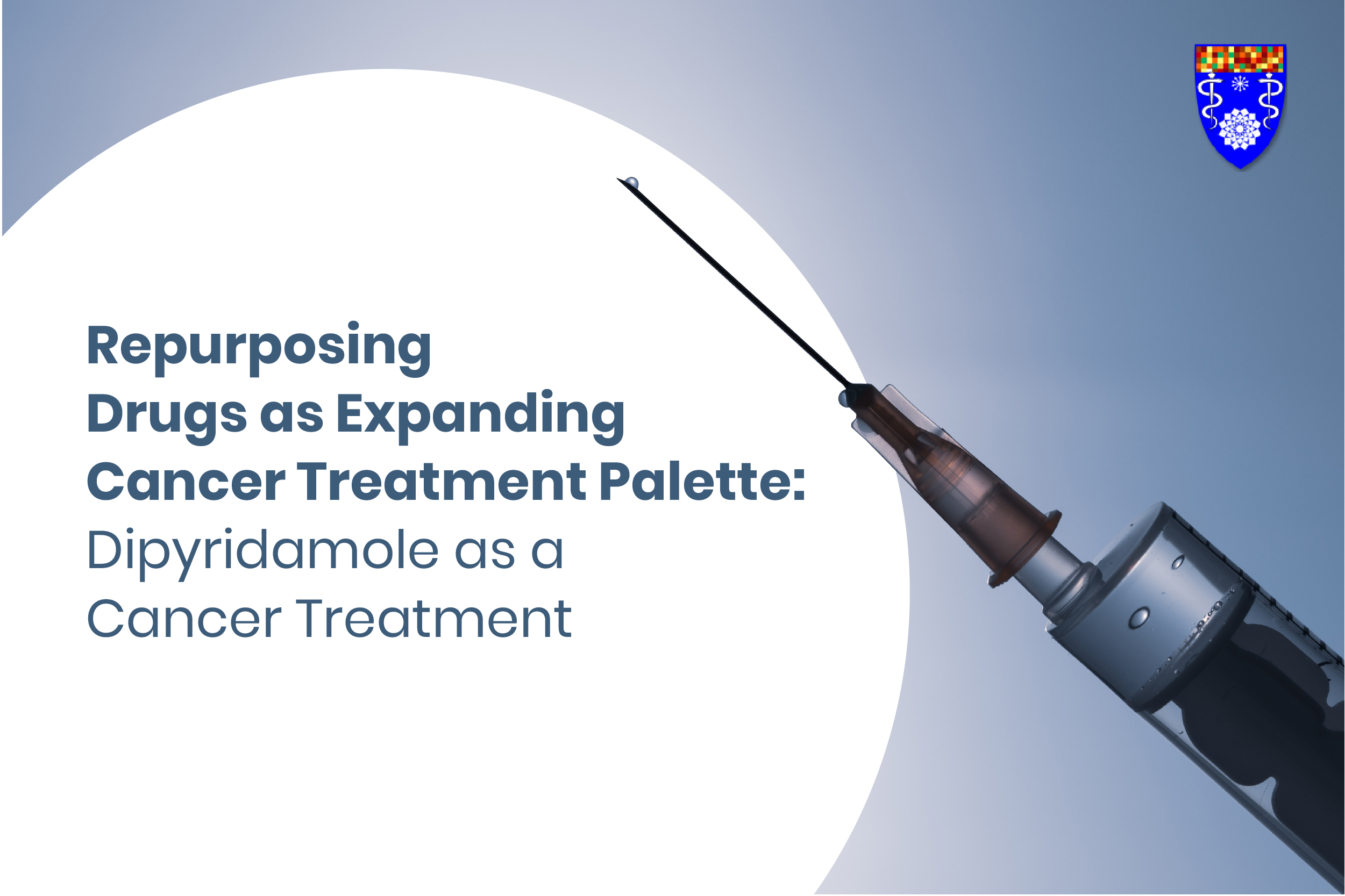Drug repurposing is beneficial not only to pharmaceutical companies and doctors but also to cancer patients. Aside from their low toxicity and availability, they are highly potential for treating cancer’s effects on the human body. One such drug is Dipyridamole. The original purpose of Dipyridamole is to prevent the formation of blood clots following a heart valve replacement.
Today, it serves as an effective treatment for cancer. Numerous studies confirm that Dipyridamole (DIP) reduces tumor size, metastasis, progression, and inflammation. Moreover, it improves the immune system response and the efficacy of chemotherapy. In addition, research concludes that it is an efficient anticancer agent for breast cancer, melanoma, Triple-negative breast cancer (TNBC), bone metastasis, and colorectal cancer.
This article will focus on Dipyridamole’s role in cancer management. We’ll discuss its potency as an anticancer agent. So, let’s begin with its original purpose.
What is Dipyridamole?
Dipyridamole is a widely prescribed drug used in treating ischemic disorders (heart problems caused by narrowed heart arteries). It limits thrombus formation by short-term vasodilation. Dipyridamole is similar to aspirin, an antiplatelet drug that limits platelet adhesion. In addition, this medication has few side effects. Therefore it is safe to use.
Dipyridamole and Cancer
Dipyridamole increases the concentration of anticancer drugs in cancer cells like
- 5-fluorouracil (5-FU),
- Piperidine
- Methotrexate
- Vincristine
Therefore, increasing the effectiveness of the treatment.
Although it is unclear how it does its effects, it still produces positive results. In 2016, Chinese researchers from the University of Changchun discovered two drug-targeted proteins. One is from a human checkpoint inhibitor – recently a target for some of the latest immunotherapy medications.
Dipyridamole, Platelets, and Increased Melanoma Survival
In 1985, Doctors at Kingston Hospitals and St Helier used 300mg of Dipyridamole to stage III and Stage IV, melanoma patients. The results are as follows as reported in The Lancet, March 23, 1985:
- 74% survived instead of 32% (of stage IV patients surviving 5 years)
- 100% survived (of stage III patients surviving 5 years)
The research team concluded that Dipyridamole prevented the primary tumor cells from moving into and around the bloodstream. As a result, it reduced the metastasis and rate of death.
Additional Information: Platelets help your blood clot when you accidentally cut yourself. However, it also allows cancer to spread. The key is to reduce platelet adhesion. It plays a significant role as an anticancer strategy.
Cancer cells:
- Uses platelets to enter the bloodstream
- Use platelets as covers to keep them undetected by the immune system
- Uses platelet-derived growth factors to create new blood supplies
- Platelets help them travel through the bloodstream to other tissues
Without platelets, they can’t do any of the things listed above.
Platelets and fibrinogen block the effects of natural killer cells. Blocking the activities of platelets helps improve the immune system’s response. What’s more, platelets are known to activate the reaction of the inflammatory system.
Dipyridamole is an effective cancer management drug. There are few known side effects, which make it safe to use. Studies say that in 2017, a relevant peer-approved review to tackle platelets in treating cancer took place.
Colorectal Cancer Drugs and Dipyridamole
A study in 1991 by Sakaguchi and a research team from the University Medical School in Fukuoka reported that Dipyridamole enhances the efficiency of 5-FU and Adriamycin in colorectal cancer after surgery.
- Breast Cancer and Dipyridamole
- The National Cancer Institute and University of Naples (USA) conducted a study on Dipyridamole (DIP) back in 2013. They reported that Dipyridamole is potentially effective in treating Triple-Negative Breast Cancer.
Animal testing shows that Dipyridamole significantly reduced metastasis and primary tumor growth. In addition, it reduced breast cancer progression following an intraperitoneal procedure. Here’s what Doctor Daniella Spano concluded:
- A low dose of Dipyridamole significantly reduced tumor growth and metastasis.
- A high dose of Dipyridamole resulted in an almost total reduction of primary tumors.
Additional Note: Further study by Wang showed that Dipyridamole blocks primary tumors and reduces bone metastasis in breast cancer patients.
Dipyridamole Dosing
Dipyridamole is on the list of Repurposing Drugs in the Oncology Database. It is also known as Persantine. For heart attacks, a dose of 300 mg is suggested. However, there’s little information about its dosing in treating cancer patients.
Repurposed Drug Combinations: Cimetidine and Dipyridamole
Many drug combination reviews point out their significance in cancer treatment. Simultaneous use of Dipyridamole and antihistamines like cimetidine (Tagamet) shows potential for cancer treatment.
Numerous studies also suggest that histamines play a crucial role in fighting cancer. The body’s natural histamines support platelets to stick together. They are primed for cancer’s use. In addition, histamines activate cancer cell growth by stimulating an H2 receptor on the cancer cell membrane.
Additional Dipyridamole Anticancer Research
Researchers reported that Dipyridamole is potentially potent in treating
advanced pancreatic cancer, especially when combined with 5FU.
Research posted by Randolph Fillmore summarizes as follows:
Dipyridamole Inhibit Growth of Cancers that Develop on Fats
The article says that lipids or fats are essential building blocks of cell membranes. They are involved in many chemical functions in the human body. (As stated by Timothy F. Osborne, Ph.D. Director of Johns Hopkins All Children’s Institute for Fundamental Biomedical Research in St. Petersburg, Florida.
He added: “However, an over-accumulation of fats carries the risk for obesity — a serious problem in America today — and contributes to certain cancers.”
Osborne and his team may have found a way to impede specific biological pathways to strip cancer tumors of the fats where they develop.
The Study
On February 18, 2021, in a recent study in the reputable peer-reviewed scientific journal – Cell Chemical Biology: Osborne and his colleagues described Dipyridamole as an ideal repositioned drug for treating cancer. Below are the type of cancers that Dipyridamole can manage, as per their studies:
- Pancreatic cancer
- Prostate cancer
- Colorectal cancer
- Breast cancer
- Liver cancer
Dipyridamole works by “starving” these cancer types by depriving them of the “fats” they need to grow. In its early stages, their work could profoundly impact treating certain cancers and other severe conditions with an imbalance in cell lipid metabolism, such as fatty liver disease.
Osborne focused his research on the molecular aspects of genes and how they are expressed and regulated to maintain homeostasis in the body. One angle of his research has been to understand metabolism better to develop insight into metabolic disorders and, he hopes, find ways to prevent them.
What are Sterol Regulatory Element-Binding Proteins (SREBP)
As per Osborne’s description: Sterol Regulatory Element-Binding Proteins regulate cellular metabolism to adapt to fluctuations in lipid availability and environmental challenges. Studies reveal that lipid metabolism disorders play a significant role in cancer development and SREBP. They limit the growth of many tumors.
Conclusion
Dipyridamole showed great potential in treating against cancer. It is safe and compatible with other anticancer drugs. Dipyridamole is one of the best examples of how drug repurposing works in treating and managing cancer.
Improve Your Quality of Living with Dipyridamole, An Effective Cancer Treatment Medication
Living with cancer is demanding and challenging. That’s why we’re here for you. At the Institute of Integrative BioOncology, we prioritize your recovery with compassion.
Dr. Paul Zhang specializes in evidence-based integrative cancer care treatment, including using off-label medicine in treating cancer.



